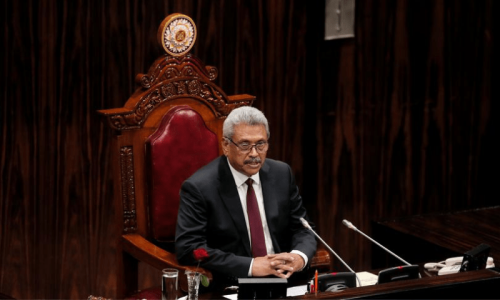COLOMBO: Sri Lanka’s protest movement reached its 100th day on Sunday, having forced one president from office and now turning its sights on his successor as the country’s economic crisis continues.
Gotabaya Rajapaksa fled his palace shortly before demonstrators invaded it last weekend and on Thursday resigned from the presidency.
His mismanagement is blamed for Sri Lanka’s financial turmoil, which has forced its 22 million people to endure shortages of food, fuel and medicines since late last year.
The campaign to oust Rajapaksa, organised mainly through posts on Facebook, Twitter and TikTok, drew people from across Sri Lanka’s often unbridgeable ethnic divides.
United by economic hardships, minority Tamils and Muslims joined the majority Sinhalese to demand the ouster of the once-powerful Rajapaksa clan.
It began as a two-day protest on April 9, when tens of thousands of people set up camp in front of Rajapaksa’s office — a crowd so much larger than the organisers’ expectations that they decided to stay on.
“When I heard the news and saw what was happening here, I decided that I should come and help them,” Nilu, a teacher from a beach town on Sri Lanka’s southern coast, told AFP.
The 26-year-old took up residence in the camp last month and is among dozens of volunteers working in the patchwork of tents now lining a section of the seafront boulevard.
A communal kitchen serves food for needy crowds visiting the site in the evenings, who queue next to signboards detailing the numerous accusations of graft and violence directed at Rajapaksa’s family.
“We need a change and we are the change,” said Nilu, who declined to give her surname.
Under Sri Lanka’s constitution, Prime Minister Ranil Wickremesinghe was automatically installed as acting president following Rajapaksa’s resignation.
He is now the leading candidate to succeed him permanently in a parliamentary vote next week.
But the veteran politician is despised by the protesters as an ally of the Rajapaksa clan — four brothers who have dominated the island’s politics for years.
‘Far from any change’
Social media activist and protest campaign supporter Prasad Welikumbura said Wickremesinghe too should go.
“It’s been 100 days since it started,” Welikumbura said on Twitter.
“But, it’s still far from any concrete change in the system. #GoHomeRanil, #NotMyPresident.” Rajapaksa’s elder brother Mahinda resigned as premier in May and he appointed Wickremesinghe to replace him — his sixth term in the post — despite his being an opposition MP representing a party with only one seat in parliament.
The move did little to assuage the protesters’ anger, and when they stormed Rajapaksa’s tightly guarded 200-year-old Presidential Palace they also set Wickremesinghe’s private home ablaze.
Published in Dawn, July 18th, 2022













































